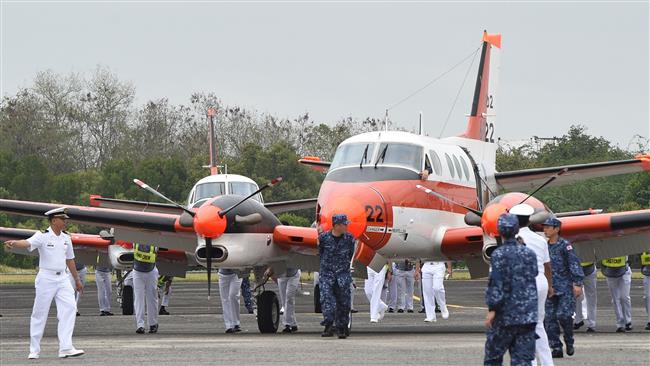Japan leases military planes to Manila to patrol South China Sea
The Philippines has taken delivery of two Japanese military surveillance aircraft to help it patrol vital sea lanes in the disputed South China Sea, officials say.
Philippine military chief General Eduardo Ano said in the capital Manila on Monday that the new planes would be deployed over Benham Rise, waters east of the main Philippine island of Luzon and the South China Sea.
Speaking at a ceremony to hand over the planes, Japanese Defense Minister Kenji Wakamiya highlighted the need for bilateral coordination to meet existing crucial regional security challenges.
"As we are faced with many security-related issues in the Asia-Pacific, including those in the South China Sea, our cooperation with the Philippines for the regional security and stability is now even more significant," Wakamiya said.
According to Manila's Defense Secretary Delfin Lorenzana, Japan will lease a total of five surplus Beechcraft TC-90 planes to the Philippines,
Japan, which has a territorial row with China over disputed islands in the East China Sea, has worked to strengthen ties with other countries in a bid to contain China’s growing influence in the region.
Beijing opposed the Philippines' lease of the planes almost as soon as it was announced last year under Manila's then-president Benigno Aquino.
The Philippines has squabbled with China for years over the South China Sea, but ties have improved under Philippine President Rodrigo Duterte.

Duterte has reversed this stance, openly courting China for trade and aid, while playing down the South China Sea dispute. Earlier this month Duterte said he was open to sharing resources with Beijing in the flashpoint waters.
Duterte has also brushed aside concerns over Chinese survey ships that had been seen near Benham Rise.
China claims sovereignty over nearly all of the resource-rich South China Sea. Brunei, Japan, Malaysia, the Philippines, Taiwan and Vietnam also have territorial claims in the waters which are also an important trade route.
Senior Chinese officials have accused the US and its allies of stirring up tensions in the region.
In January, Chinese Foreign Ministry spokeswoman Hua Chunying warned the United States not to make any rash comments about its islands in the South China Sea, urging the White House to mind the facts and not interfere in the territorial dispute. She was responding to comments made by White House Press Secretary Sean Spicer who said Washington intended to stop Beijing’s “takeover” of the South China Sea.
VIDEO | Hind Rajab Foundation names Israeli war criminals vacationing after Gaza genocide
VIDEO | Australians rally for Gaza ahead of Christmas festivities
VIDEO | Attacks on Sana'a
Iran reports further drop in annual inflation rate in December
Israel indicts two settlers over suspected spying for Hezbollah
Iran: US airstrikes on Yemen war crimes, violation of international law
Yemeni armed forces down F-18 fighter jet, repel US-UK attack: Spokesman
Iran warns against US-Israeli plot to weaken Muslims, dominate region










 This makes it easy to access the Press TV website
This makes it easy to access the Press TV website